
Divisions
- About the Tasmanian State Service
- Contact Us
- Aboriginal employment
- Culture of learning
- Diversity and inclusion
- Digital capability
- Employee surveys
- Employment arrangements
- Employment policy
- Managing performance
- Work health, safety and wellbeing
- Workforce planning and reporting
- Awards and Agreements
- Managing and leading change
- Senior Executives
- Managing Positions in the State Service (MPSS 2016)
- Legislation
- Coronavirus (COVID-19) Information for Staff
Contact Details
By phone
Find the number of a specific division or office to contact them directly or call Service Tasmania on 1300 135 513.
Our staff
Use the Tasmanian Government Directory to find staff contact details
Social media
Follow our social media accounts to keep up to date with specific programs and initiatives.
Chapter 5 – Providing Safe and Supportive Workplaces
Occupational Violence and Aggression Against State Service Employees
In April 2017, the State Service and key unions launched a joint awareness campaign to help address occupational violence and aggression against State Service employees. The launch included a Statement of Principles, making it clear that the State Service is committed to:
- providing a safe working environment;
- valuing equally the safety and well-being of employees and the public; and
- promoting a culture where violence and aggressive behaviour is not accepted.
The awareness campaign will be expanded over coming months, and will be supported with training and resources for managers and employees.

Stress Management Training Intervention Study
TTC in partnership with the University of Tasmania (UTAS) developed a stress management training intervention study for employees in higher-stress (particularly front-line service) roles across the State Service.
The training will be delivered by a recognised and accredited service provider to:
- cultivate resilience and reduce distress;
- reduce emotional reactivity and improve interpersonal relationships;
- develop attention and improve task performance;
- lessen the impact of psychosocial risk factors; and
- reduce the number and severity of work-related safety and conflict incidents.
Employee Assistance Program
The State Service Employee Assistance Program (EAP) is designed to assist employees and officers with 24/7 access to information, support, and practical solutions for issues that impact their work, health, and life.
In August 2016, Converge International was appointed as the preferred supplier for services under the EAP. The move to a single service provider allows for better reporting, collaboration, and the ability to feed into an integrated framework that will assist in building a mentally healthy workplace.
Workplace Flexibility
Work continues at a whole-of-service level to increase workplace flexibility arrangements where possible to support employees and officers in managing their work/life balance.
A total of 269 formal workplace flexibility agreements were in place as at 30 June 2017 (203 in 2016).
Agencies provide flexible working arrangements including flexible start/finish times, access to laptops to support flexible work practices, and access to flex time. Informal flexible arrangements are also support by agencies, with discussion between employees and managers the basis for putting arrangements in place. These arrangements are not formally reported.
The Port Arthur Historic Site Management Authority, the Department of Treasury and Finance, the Department of Premier and Cabinet, and the Tasmanian Audit Office have all moved to promoting flexible arrangements when advertising vacancies.
In addition to formal and informal flexibility, employees have the ability to access additional leave, in 2016-17 this included:
- 652 permanent and 14 fixed-term employees who participated in the State Service Purchased Leave Scheme (746 participants in 2015-16);
- 233 permanent and seven fixed-term employees who participated in the State Service Accumulated Leave Scheme (321 participants in 2015-16); and
- an increase in employees accessing parental leave entitlements:
- 864 employees accessed paid maternity or parental leave (16 agencies);
- one employee accessed paid adoption leave; and
- 596 employees accessed unpaid maternity or parental leave (13 agencies).
Family Violence
As part of the Public Sector Union Wages Agreement 2016, employees now have access to up to 10 days family violence leave per year, with support provisions included in Awards and Agreements. Employees can also access personal leave to provide support to a family member experiencing family violence.
Agencies reported a total of 33 applications for leave were made and approved under the provisions of Employment Direction No. 28: Family Violence – Workplace Arrangements and Requirements (ED28), during 2016-17 (compared to 29 in 2015-16). Agencies also reported a variety of informal support options were available to employees that included flexible working arrangements, workplace adjustments, counselling, and accommodation assistance.
Agencies also continued to ensure that key staff were trained in the support of employees who may be experiencing family violence, with a combined total of 365 managers and Contact Officers trained during the period. Agencies also reported information and training was provided to other employees outside of the requirement of ED28.
Work Health, Safety and Wellbeing Activities
The State Service Management Office worked closely with a number of agencies and other organisations to develop and coordinate work health and safety initiatives for the TSS. These include:
- working with the Office of the Solicitor General, the administrator of the Tasmanian Risk Management Fund, and agencies on the initiation of a health and safety Legal Advisory Service;
- active involvement in the development of a best practice framework for improving mental health and wellbeing across the state service with the Department of Health and Human Services (DHHS), and Worksafe Tasmania;
- working with DHHS and Worksafe Tasmania as part of the Tasmanian Healthy and Safe workplace initiative;
- facilitating discussions between BeyondBlue, and the Department of Police, Fire and Emergency Management on the development of a mental health and wellbeing framework for first responders. This has resulted in mental health first aid training and a pilot peer support program; and
- facilitating a workshop with participation from agencies to better understand our ageing workforce.
Back to: Contents | Previous to: Chapter 4 | Next to: Chapter 6
